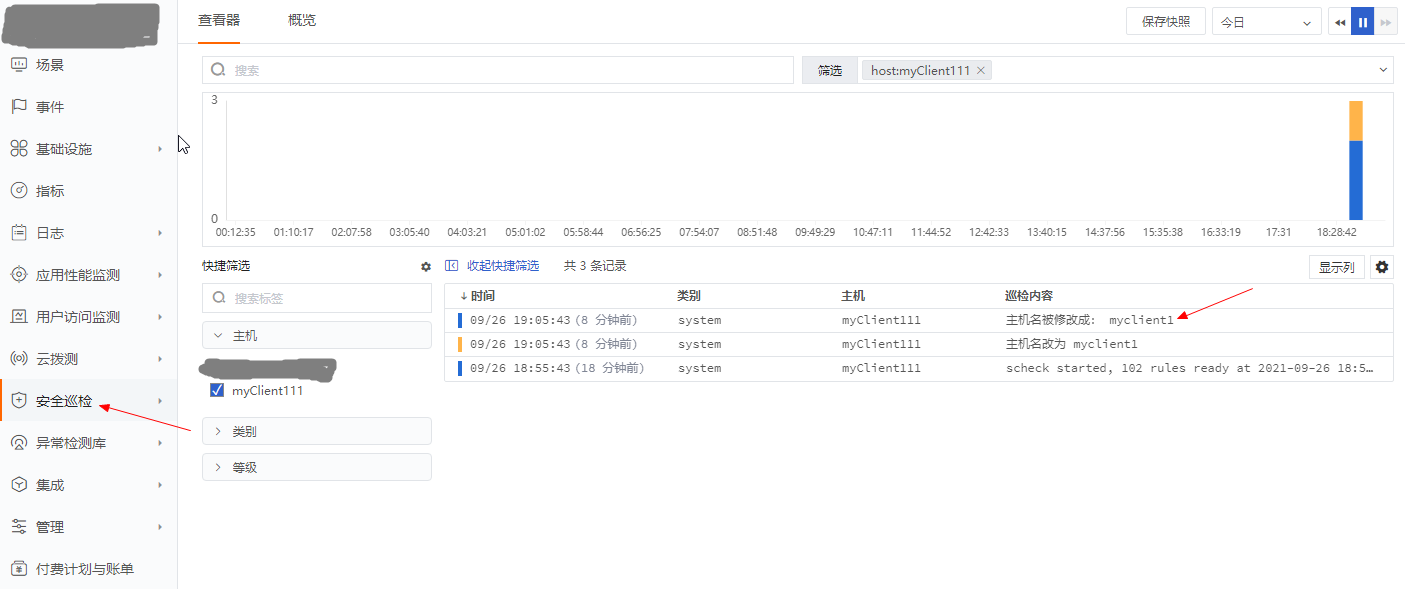User-defined rule files and lib libraries¶
- Version: 1.0.7-5-gb83de2d
- Release Date: 2022-08-30 03:31:26
- Supported Operating Systems: windows/amd64,windows/386,linux/arm,linux/arm64,linux/386,linux/amd64
scheck Rule Introduction¶
Lua rule introduction:
The rule script consists of two files: a lua file and a manifest file, both of which must exist simultaneously! And they must share the same prefix!
-
<rule-name>.lua: This is the judgment script for the rule, implemented based on Lua syntax, but it cannot reference or use standard Lua libraries; only built-in Lua libraries and built-in functions can be used. -
<rule-name>.manifest: This is the rule list file. When the corresponding Lua script detects an issue (result == true), there is a set of corresponding behaviors defined in the manifest file.
Manifest File Field Description¶
| Manifest Field | Field Description | Configuration Description |
|---|---|---|
| id | Name | Named according to the id rule plus the functionality of this script |
| category | system | Multiple types can be used: system, os, net, file, db, docker... |
| level | Alert Level | Optional types include: debug, info, warn, error |
| title | Rule Title | Generally named after the function of this rule |
| desc | Description | Displays and explains the operation results of the rule with text |
| cron | Custom Execution Interval | Refer to: Cron Examples |
| disabled | Switch | Optional field: true or false |
| os_arch | Supported Operating Systems | Array type, options: "windows" "linux" |
scheck built-in rules are located in the rules.d directory under the installation path.
User-defined Exclusive Rules and Lua Libraries¶
This example demonstrates a scheduled rule that checks the hostname:
- Write a lua file
Create a file named
10001-hostname.luain the user directorycustom.rules.d. The code is as follows:local function check() local cache_key = "hostname" local old = get_cache(cache_key) --get_cache(key) is a go built-in function used for lua script caching, paired with set_cache(cache_key, current) if old == nil then local current = hostname() -- go built-in function to retrieve the hostname set_cache(cache_key, current) return end local current = hostname() if old ~= current then trigger({Content=current}) -- go built-in function to send messages to datakit or local logs set_cache(cache_key, current) end end check()
Note: scheck expects user-defined rule names to follow these standards
- Write a manifest file
Create a file named
10001-hostname.manifestin the user directorycustom.rules.d. The content is as follows:
id="10001-hostname"
category="system"
level="info"
title="Hostname Modified"
desc="Hostname has been modified to: {{.Content}}"
cron="0 */1 * * *"
# Switch
disabled=false
os_arch=["Linux"]
The current rule manifest configuration executes every minute.
- Restart the server
- Send the message
After restarting the server, the script will run every minute, and you can modify the hostname after one minute.
The static hostname is stored in the /etc/hostname file and can be modified via the command.
- Observe
Log in to Guance Console -> Navigation Bar -> Security Check: View inspection information and find a message indicating that the hostname was modified.
Rule Library¶
Lua library files and user-defined libraries:
The scheck built-in Lua reference library files are located in the rules.d/libs directory under the installation path. The function list and interface documentation can be viewed online.
Libraries do not require a manifest file. In Lua, libraries need to be declared once when referenced, for example, to reference the directorymonitor from libs, declare it once:
local directorymonitor = require("directorymonitor")
local function check()
directorymonitor.add("/usr/bin")
end
check()
Note: Users should not modify the built-in lib libraries and Lua rule files of scheck. Each installation update and service restart will overwrite the rule files.
User-defined rules and libraries can be placed in the custom.rules.d directory. If there are custom Lua reference libraries, they can be placed in the custom.rules.d/libs directory.
When pointing to another path, simply modify the configuration file scheck.conf:
[system]
# ##(Required) Directory where the system stores detection scripts
rule_dir = "/usr/local/scheck/rules.d"
# ##Customer-defined directory
custom_dir = "/usr/local/scheck/custom.rules.d"
# Optional User-defined Lua libraries, not usable by `rule_dir`, default is the `libs` directory under the user directory
custom_rule_lib_dir = "/usr/local/scheck/custom.rules.d/libs"
Appendix¶
Lua Rule Naming Standards¶
The Lua included with scheck is named by type, with the ID at the front representing a specific rule type.
User rule names should start with numbers and must not be less than 10000, for example: 10001-xxx.lua
scheck built-in rule naming standards:
| ID Range | Rule Type |
|---|---|
| 0000 | System Cache |
| 0001~0199 | system |
| 0200~0299 | Network |
| 0300~0310 | Container-related |
| 0500~0510 | Databases |
| 10000 and above | User-defined |
User-defined Lua that does not follow the naming standards will result in rule loading failure.
Manifest File Cron Field Settings¶
Scheck supports two execution modes: interval execution and long-term type. Currently, fixed-time execution is not supported!
Interval Execution Cron¶
cron="* */1 * * *" # Executes once per minute
cron="* * */1 * *" # Executes once per hour
cron="* * * */1 *" # Executes once per day
Long-Term Rules¶
Long-term rules keep running continuously, reporting messages within one second upon triggering. For example: when a file changes.
